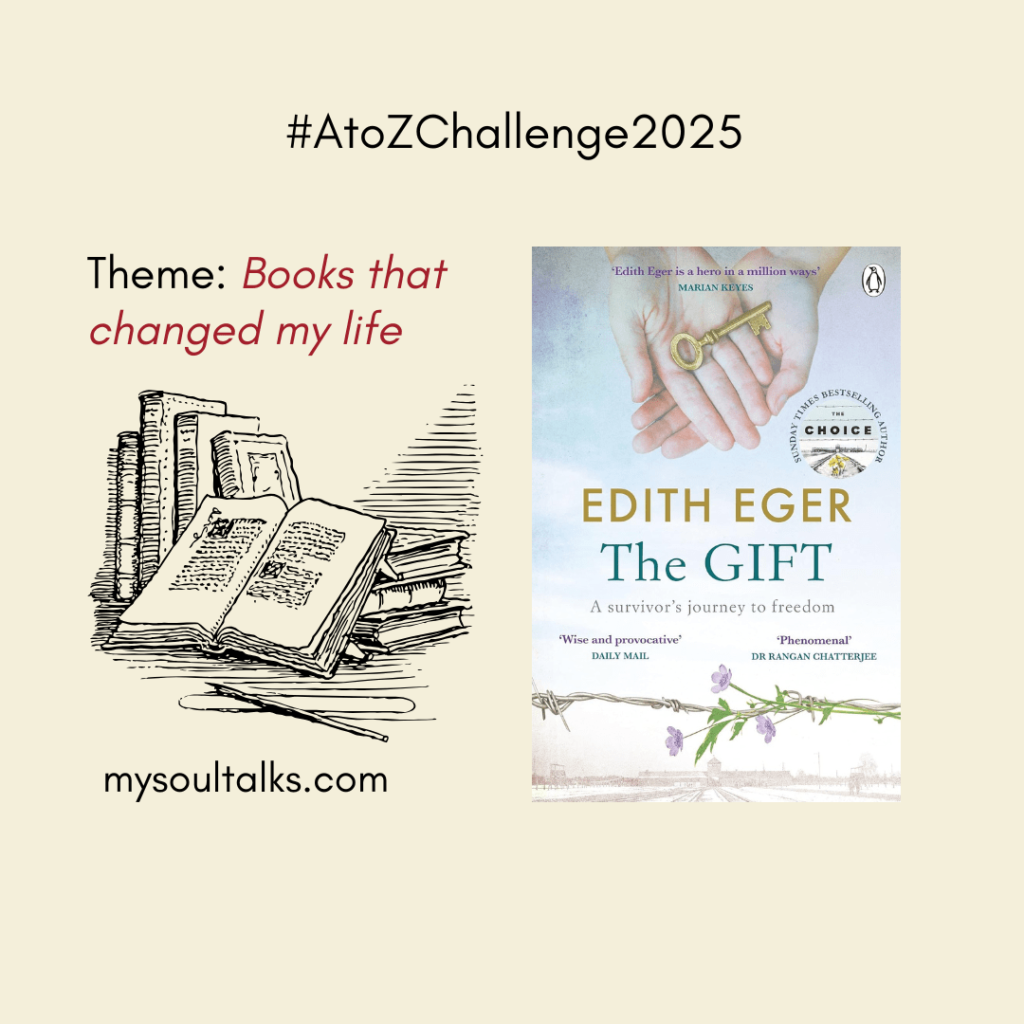I’m participating in the #AtoZ April Blogging Challenge 2025 and this will be my third year of joining the vibrant community that loves this one-of-a-kind creative challenge.
This year, my theme is—BOOKS THAT HAVE CHANGED MY LIFE—which means they are not just my favourite books, but they’ve also left a deep and lasting impact on me and continue to do so until this day. I’m also blogging on my other blog—’TheSkyGirlMusings‘—and my theme there is THE A TO Z OF SELF CARE. Do check it out and follow me there, if you are new to it. If you leave your blog link, I’ll be happy to follow you back too. 🙂

The Gift by Edith Eger

I first listened to Edith Eger’s story in a podcast hosted by Dr Rangan Chatterjee nearly three years ago.
Edith Eger, 97 years old, a holocaust survivor who later became a Psychologist, shared about the horrors of life at Auschwitz, and how she used the power of the mind, to survive the ordeal, and subsequently, how that led to her healing.
The episode was mind-blowing and the conversation came to be one of the most powerful ones that I’d ever heard in recent times. It prompted me to know more about Edith and her journey, so I ordered a copy of this book from Amazon. Needless to say, the book was quite an experience to read—both enlightening and hugely transformative for me, as I guess, it must have been for millions of people listening to her story and how she chose to deal with it.
Behind the story of a holocaust survivor, and her experience in the concentration camps, there is a deeply insightful narrative full of wisdom and empathy and believe it or not, humour, which comes as a surprise! What really spoke to me was the underlying message that she shares in this book—that the worst prison she experienced was not the prison that Nazis put her in but the one she had created for herself—the prison within her own mind.
Edith became a psychologist later and through her practice, she met many patients that she worked with. In this book, she shares her experiences and the lives of her patients, and includes some very important thought-provoking questions and takeaways in each of the chapters, for the reader to work upon.
At the end of each chapter we find ‘Keys to Free Yourself‘, that will help us unlock the prisons of our mind. The 12 ‘keys’ she recommends, are the ones to heal ourselves from the prisons of victimhood, avoidance, self-neglect, secrets, guilt and shame, unresolved grief, rigidity, resentment, paralysing fear, judgement, hopelessness, and not forgiving. These consolidate what we’ve learned in the chapter and can be used to facilitate our own healing. Some require us to use our imagination. Others provide prompts that we can use in journaling. Then there are some that would be ideal to work through with a therapist.
As Edith says:
To heal doesn’t mean to get over it, but it does mean that we are able to be wounded and whole, to find happiness and fulfillment in our lives despite our loss.”
That was very powerful for me. I was able to relate this to my own circumstances, as I revisited the past and tried to process the wounds that were left unattended and untreated for a long time. The book gave me the impetus needed to continue the work that I had been doing with my therapist, towards healing.
Personally, I think the book is a testament to the power of the mind that can be trained to rise above one’s circumstances and recover from anything that life throws at you. Edith’s story of escape, healing, and her journey to freedom tells us that Through her message of healing, Edith gently nudges the reader to change their thoughts and behaviors, that might be keeping them imprisoned in the past.
In her strength and tenacity to not let her past define who she is, Edith rises like a phoenix, charting out a path for herself that also inspires others to follow. She proves that grit, determination and the power of one’s mind can help anyone to work through unimaginable pain and trauma to find freedom and to live life to the fullest.
The best life lesson for me from this book is this:
“It’s not what happens to us that matters most, it’s what we do with our experiences.“
This is why I think everyone should read this absolutely amazing book!
*******
If you’d like to read the rest of my A to Z posts written for the #AtoZAprilChallenge2025, then please click here to read on.

